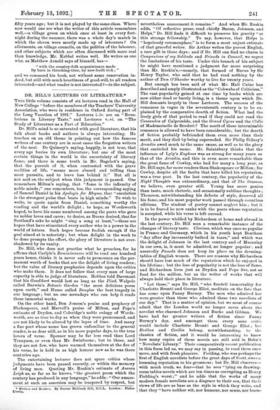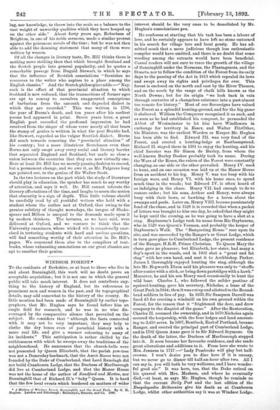DR. HILL'S LECTURES ON LITERATURE.* THIS little volume consists of
six lectures read in the Hall of New College " before the members of the Teachers' University Association, who were in residence in Oxford daring part of the Long Vacation of 1891." Lectures i.-iv. are on "Revo- lutions in Literary Taste," and Lectures v.-vi. on " The Study of Literature as a Part of Education."
Dr. Hill's mind is so saturated with good literature, that his talk about books and authors is always interesting. He touches on an old theme in pointing out how the famous writers of one century are in most cases the forgotten writers of the next. De Quincey's saying, happily, is not true, that every age buries its own literature ; but one of the most certain things in the world is the uncertainty of literary fame; and there is some truth in Mr. Bagehot's saying, that the pursuit of it, when contrasted with the grave realities of life, " seems more absurd and trifling than most pursuits, and to leave less behind it." But all is not said on the subject when this judgment is passed. One remembers Milton's saying, that "fame is the infirmity of noble minds ;" one remembers, too, the corresponding saying of Samuel Daniel in his Apologie for Rhyme, that "emulation is the strongest pulse that beats in high minds." To wish to write, to quote again from Daniel, something worthy the reading and the world's delight ; to hope, as Wordsworth hoped, to have his name numbered among the poets who gave us nobler loves and cares; to desire, as Burns desired, that for Scotland's sake he might " sing a song at least,"—these are hopes that have stimulated every author who is a power in the world of letters. Such hopes become foolish enough if the goal aimed at is notoriety ; but when delight in the work to be done prompts the effort, the glory of literature is not over- shadowed by its vanity.
Dr. Hill, who does not practise what he preaches, for he affirms that Carlyle's Reminiscences will be read one hundred years hence, thinks it is never safe to pronounce on the per- manent worth of hooka that are the delight of living readers ; but the value of literary prophecies depends upon the critics who make them. It does not follow that every man of large capacity is able to judge of literature. Hobbes told Davenant that his Gondibert would last as long as the Iliad, Walpole called Darwin's Botanic Garden "the most delicious poem upon earth," and Hume called Douglas the best tragedy in our language ; but no one nowadays who can help it reads these immortal works.
On the other hand, Ben Jonson's praise and prophecy of Shakespeare, and Marvell's praise of Milton, and Pope's estimate of Dryden, and Coleridge's noble eulogy of Words- worth, are as true to-day as when they were pronounced, and are not likely to be altered by the lapse of time. And many a fine poet whose name has grown unfamiliar to the general reader, is as dear still, as in his more popular days, to the true lovers of verse. Spenser may be far less read than Lord Tennyson, or even than Mr. Swinburne ; but to those, and they are not few, who have warmed themselves at the fire of his verse, he is held in as high honour now as he was three centuries ago.
The entertaining lecturer does not spare critics whose judgments have been passed recently, or within the memory of living men. Quoting Mr. Ruskin's estimate of Aurora Leigh as, so far as he knows, "the greatest poem which the century has produced in any language," he adds " Our amaze- ment at such an assertion may be tempered by respect, but • Writers and Readers. By George Birkbeok Hill, D.O.L. London : Maher trnwin. nevertheless amazement it remains." And when Mr. Ruskin adds, " Of reflective prose, read chiefly Bacon, Johnson, and Helps," Dr. Hill finds it difficult to preserve his gravity " at this strange fellowship." To say, however, that Helps is "hopelessly commonplace," is to form a most unjust estimate of that graceful writer. Sir Arthur writes the purest English, a rare gift in these days ; and if Dr. Hill can find no charm in Companions of my Solitude and Friends in Council, we regret the limitations of his taste. Under this branch of his subject he might have mentioned a judgment far more surprising than Mr. Buskin's,—namely, that formed of Burns by Sir Henry Taylor, who said that he had read nothing by the author of Tam O'Shanter worthy to live for twenty years.
But enough has been said of what Mr. Hall Caine has described and amply illustrated as the "Cobwebs of Criticism." The vast popularity gained at one time by books which are now either dead or barely living, is a theme upon which Dr. Hill descants largely in these Lectures. The success of the romances in vogue in the seventeenth century is to be ex- plained by the comparative dearth of fiction. What had the lively girls of that period to read if they could not read the Cassandra of Calprenede, and the Grand Cyrus and the Clelie of Mademoiselle de Scuderi P The merit of these interminable romances is allowed to have been considerable; but the dearth of fiction probably befriended them even more than their merit, and they died by being superseded. Sir Philip Sidney's Arcadia owed much to the same cause, as well as to the glory that encircled his name. Mr. Saintebury thinks that the influence of Lyly's Euphues was as strong for many years as that of the Arcadia, and this is even more remarkable than the great fame of Cowley, who had for many a long year, as Dr. Hill says, far more readers than Shakespeare or Milton ; for Cowley, despite all the faults that have killed his reputation, was a true poet. In the last century, the popularity of the Night Thoughts was extraordinary, and that of The Seasons, we believe, even greater still. Young has more genius than taste, much rhetoric, and occasionally sublime thoughts ; Thomson, notwithstanding hie defects of style, deserved all his fame, and his most popular work passed through countless editions. The student of poetry cannot neglect him ; but it is to be feared he now ranks with the poets whose reputation is accepted, while his verse is left unread.
In the power wielded by Richardson at home and abroad in the last century, Dr. Hill sees a remarkable instance of the changes of literary taste. Clarissa, which was once so popular in France and Germany, which in his youth kept Bentham " day after day incessantly bathed in tears," and which was the delight of Johnson in the last century and of Macaulay in our own, is, it must be admitted, no longer popular ; and assuredly Pamela does not keep its place on the dressing- tables of English women. There are reasons why Richardson should have lost much of the reputation which he enjoyed in his lifetime ; but the loss of popularity is not the loss of fame, and Richardson lives just as Dryden and Pope live, not as food for the million, but as the writer of works that will always hold their place in literature.
" Let those," says Dr. Hill, " who foretell immortality for Charlotte Bronte and George Eliot, meditate on the fate that has come upon Fanny Burney. The men who admired her were greater than those who admired these two novelists of our day." That is a matter of opinion, but we must of course admit that the London world no longer raves about the novelist who charmed Johnson and Burke and Gibbon. We have had far greater writers of fiction since Fanny
Burney's day, and amongst them every sane critic would include Charlotte Bronte and George Eliot ; but
Evelina and Cecilia belong, notwithstanding, to the
classics of fiction, and it would be interesting to know how many copies of these novels are still sold in Bohn's " Novelists' Library." Their comparatively recent publication in this form led us, we may say in passing, to read them once more, and with fresh pleasure. Fielding, who was perhaps the first of English novelists before the great days of Scott, owes a lessening reputation to his grossness ; but Dr. Hill observes— with much truth, we fear—that he sees "lying on drawing-
room tables novels which are ten times as corrupting as Henry
Fielding's worst ;" and he adds that the works of many modern female novelists are a disgrace to their sex, that their views of life are as base as the style in which they write, and that they " have neither wit, nor humour, nor sense, nor learn- lag, nor knowledge, to throw into the scale as a balance to the vast weight of unworthy qualities which they have heaped up on the other side." About forty years ago, Robertson of Brighton, in one of his noble sermons, made a similar protest against the poisonous novels of the time ; but he was not then able to add the damning statement that many of them were written by women.
Of all the changes in literary taste, Dr. Hill thinks there is nothing more striking than that which brought Scotland and the Scotch people into general popularity, and he quotes a remarkable passage from Dugald Stewart, in which he says that the influence of Scottish associations "furnishes no resources to the writer who aspires to a place among the English classics." And the Scotch philosopher adds :—" Nay, such is the effect of that provincial situation to which Scotland is now reduced, that the transactions of former ages are apt to convey to ourselves exaggerated conceptions of barbarism from the uncouth and degraded dialect in which they are recorded." This was written in 1796, the year of Burns's death, and ten years after his earliest poems had appeared in print. Seven years later, a great English poet recorded the profound impression he had received from the singer of whose verse nearly all that bears the stamp of genius is written in what the poet Beattie had, like Stewart, regarded as the vulgar Scottish dialect. Burns did much towards removing the " provincial situation " of his country ; but a more illustrious Scotchman even than Burns not only swept away every social and literary barrier that separated England and Scotland, but made so close a union between the countries that they are now virtually one. Here at least Dr. Hill has no merely passing fashion to record, but a permanent change, and we owe it, as Mr. Palgrave long ago pointed out, to the genius of Sir Walter Scott.
In the two lectures on the part which the study of literature should play in education, the speaker has much to say worthy of attention, and says it well. Dr. Hill cannot tolerate the literary affectations of the time, and laughs to scorn the notion that obscurity is a sign of depth. This little volume should be carefully read by all youthful writers who hold with a student whom the author met at Oxford, that owing to the greater subtlety of thought nowadays, the tongue of Shake- speare and Milton is unequal to the demands made upon it by modern thinkers. The lectures, as we have said, were delivered at Oxford, and we venture to think that the University examiners, whose wicked wit is occasionally exer- cised in torturing students with hard and useless questions, will find something worthy of their attention in Dr. Hill's pages. We commend them also to the compilers of text- books, whose exhausting annotations on our great classics are apt to smother their genius.



































 Previous page
Previous page